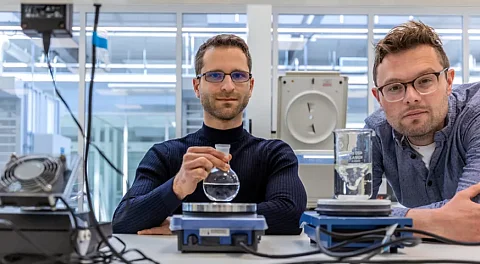Making Bioplastics as Nature Intended: This Start-Up Proves It's Possible
06-06-2024
Lactic acid is widely used in food, cleaning products, solvents, shampoos, and creams—and it can also be used to make bioplastic. For example, from lactic acid derived from sugar beets. Start-up Nature’s Principles has developed a cheaper, more efficient, and safe technology for this purpose.
Producing poly lactic acid (PLA), a type of bioplastic, from lactic acid is already a known process. It involves converting sugars—essentially carbohydrates—into lactic acid via fermentation, which then serves as a chemical base for plastic. These fermentation processes typically rely on refined sugars that have been purified and sterilized in a sugar factory. This purification requires significant energy and water, making the process costly. On average, one ton of lactic acid produced through traditional methods costs between 900 and 1,200 euros.
More Affordable
Nature’s Principles has developed a new, patented technology that allows lactic acid to be produced from unrefined sugars, sourced from raw materials like sugar beet pulp, potatoes, or cellulose from woody crops, sawdust, or old paper. This innovation reduces the price per ton of lactic acid by 30 percent, bringing it down to around 700 euros. This price reduction also lowers the cost of PLA, enabling this bioplastic to better compete with petroleum-based plastic. "We’re much more flexible in terms of the raw materials we can use and convert to sugar. It’s a more cost-effective way of producing lactic acid. Plus, we’re no longer competing with food production, which also requires sugar, and we avoid issues related to land use. There's an ongoing debate about whether sugar should even be used in chemistry for bioplastics," says CEO and co-founder Jan Pieter van Tilburg. "That’s what we bring to the market."
Naturally Selected
Co-founder Jules Rombouts developed the fermentation technique during his PhD research at TU Delft with his then-partner. He used different bacteria capable of fermenting a mix of sugars, which are naturally selected during the process—hence the start-up's name. This approach contrasts with existing methods. In 2020, Rombouts co-founded Nature’s Principles with his former partner. After his partner stepped away, Rombouts gave a pitch on bioplastics during a TU event to find a new co-founder. He met Van Tilburg, who was immediately inspired, and they began working together from that moment.
Scaling Up
The lab and pilot installation for fermenting raw sugars are located at Plant One in Rotterdam, an innovation hub for sustainable businesses in the Botlek area. This facility can currently produce 100 kilograms of lactic acid per batch. “The next step is scaling up by 50 to 200 times, reaching an annual production of 10,000 to 100,000 tons of lactic acid, which would be on a commercial scale. We aim to achieve this within the next two years,” says Van Tilburg. Scaling up to factory design will cost between two and three million euros, and Nature’s Principles is actively seeking investors.
Licensing the Technology
Nature’s Principles does not intend to produce lactic acid themselves but instead plans to license their technology. After three years, the start-up has successfully moved beyond the pilot phase, proving their technology works with sugar beets. “We now want to test other raw materials to improve our business case. We believe we’re working on something innovative and game-changing for society, but ultimately, it depends on what our clients want,” says Van Tilburg.
Bioplastics
The lactic acid produced using their technology can be used to make PLA, the most commonly used bioplastic today. This means it's derived from biological rather than fossil sources, like oil or gas. “It’s bio-based, compostable, biodegradable at 55 degrees, and recyclable,” says Van Tilburg. PLA is ideal for 3D printing plastic products because of its low melting point, allowing it to be molded into various complex shapes, which is currently its primary use.
Against Nature
Lactic acid is also versatile for other applications, from cleaning products to cosmetics, food products, and solvents. “But the main market for lactic acid is PLA,” explains Van Tilburg. By advancing this technology, the start-up is contributing to the greening of the chemical industry. Van Tilburg, originally from Brazil, previously worked as an engineer for the oil company Petrobras on an offshore drilling platform. “I saw how damaging and unnatural oil extraction is to the environment,” he says. “Our technology makes it cheaper and safer to produce PLA from lactic acid, offering a viable alternative to chemicals derived from fossil fuels. Scaling up is essential for this, and it’s achievable if we can use more than just sugar beets as raw materials. This way, we can potentially replace fossil-based resources across the economy.”
Green Chemistry Accelerator
This year, Nature’s Principles was one of the five participants in the Green Chemistry Accelerator (GCA) program by Groene Chemie Nieuwe Economie (GCNE). This platform aims for a circular chemistry industry with innovative technologies, free from fossil fuels and emissions by 2050. The GCA program, co-founded with Invest-NL and the Regional Development Agencies (ROMs), helps start-ups scale into full-fledged companies, enabling them to build pilot plants, enter the market, and ultimately produce thousands of tons of recycled or bio-based plastic.
Shared Challenges
During the program, Nature’s Principles expanded its network and gained insight into building a solid business case and prioritizing effectively. “The valuable contacts with other start-ups were most beneficial for us. Because they’re similar to us and face the same challenges, we could have meaningful discussions about these issues,” says Van Tilburg.
This article was also published by Change Inc., written by editor André Oerlemans. It is part of a series of articles on Groene Chemie, Nieuwe Economie.

